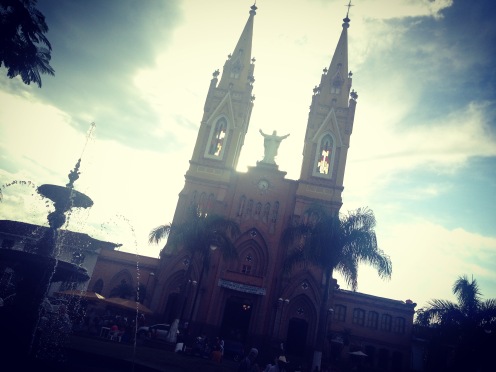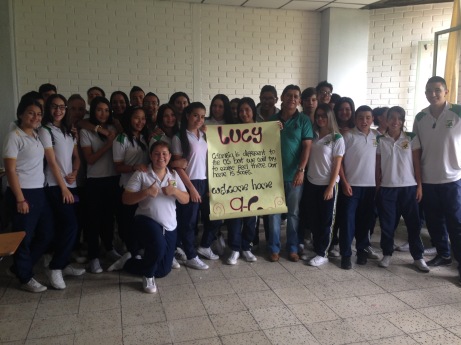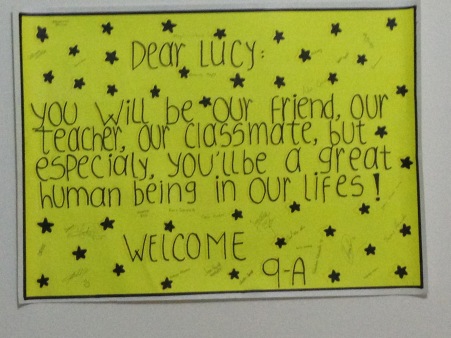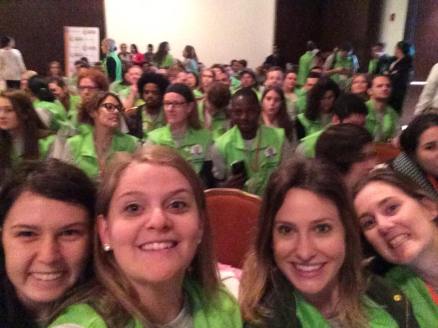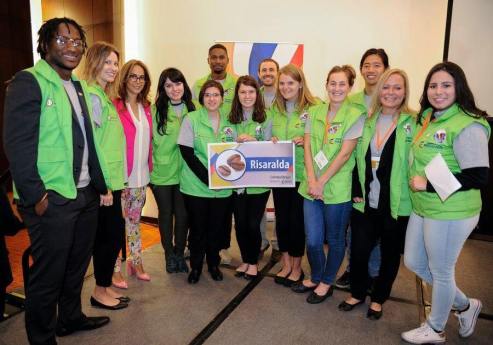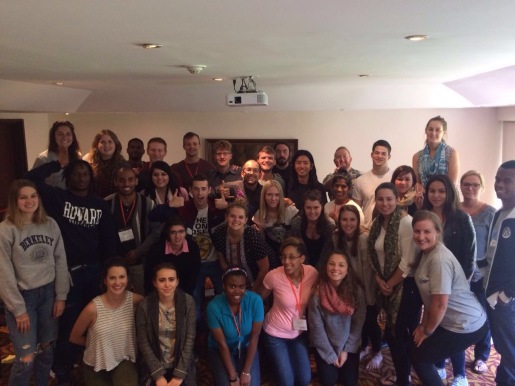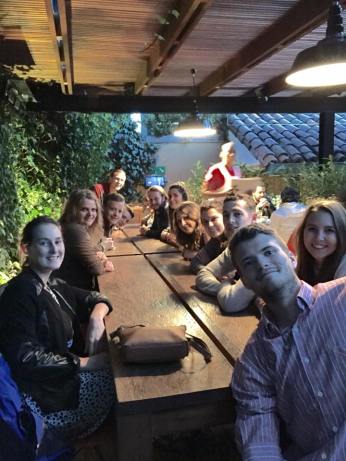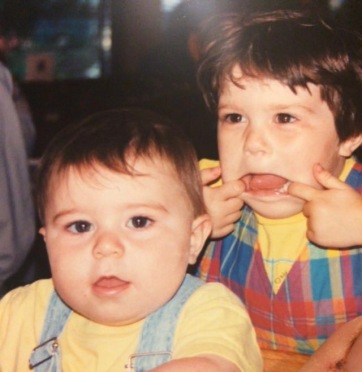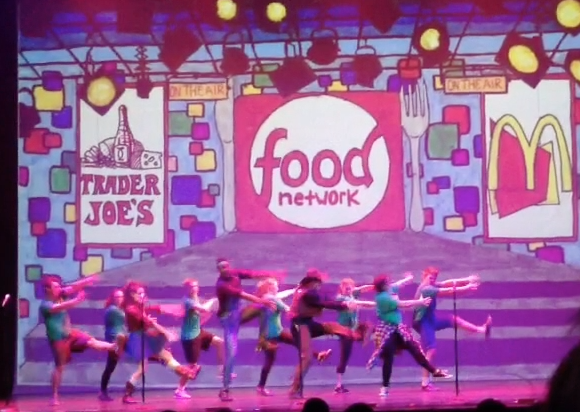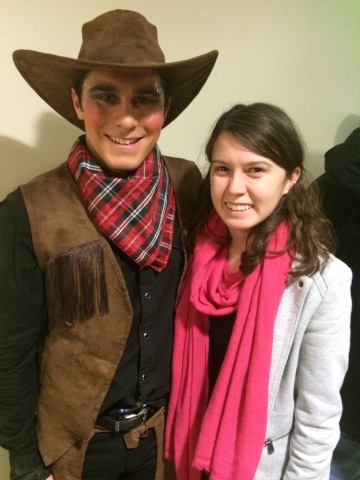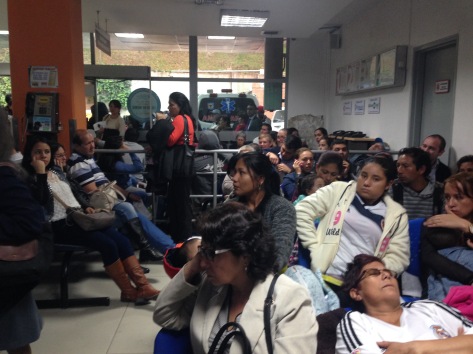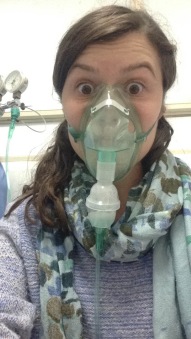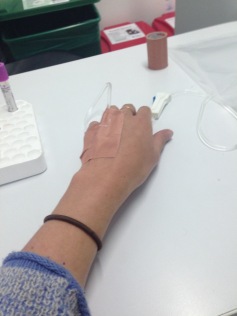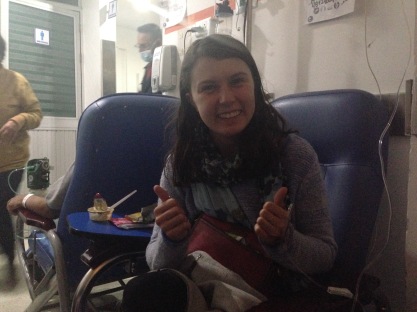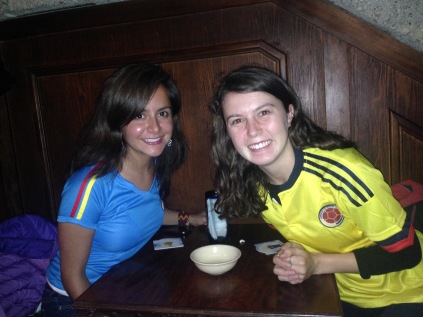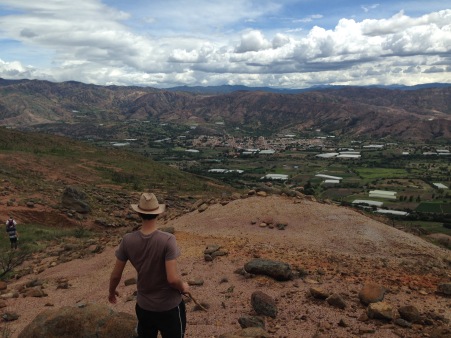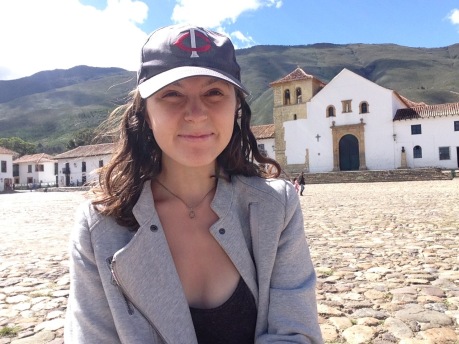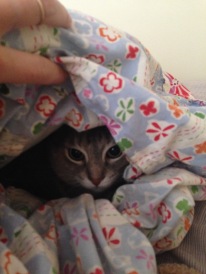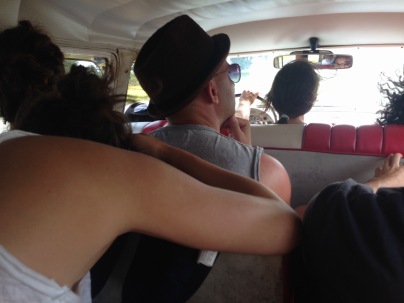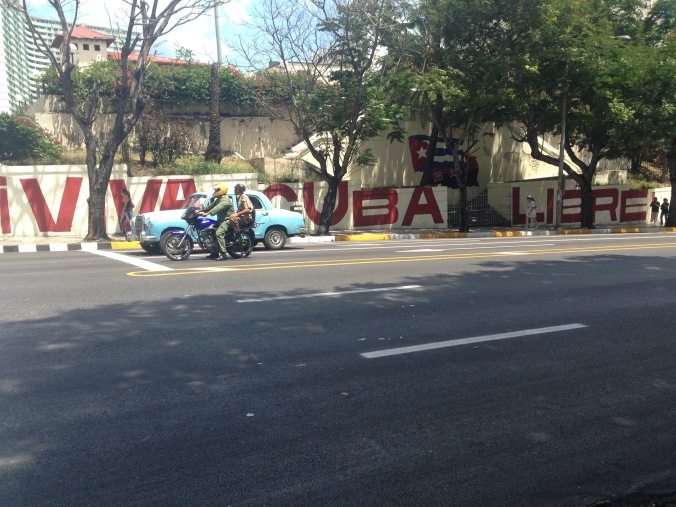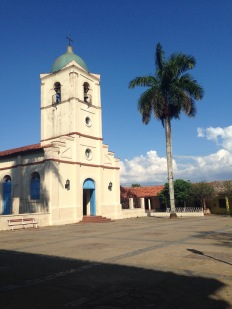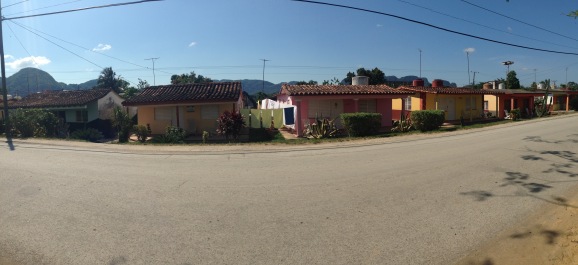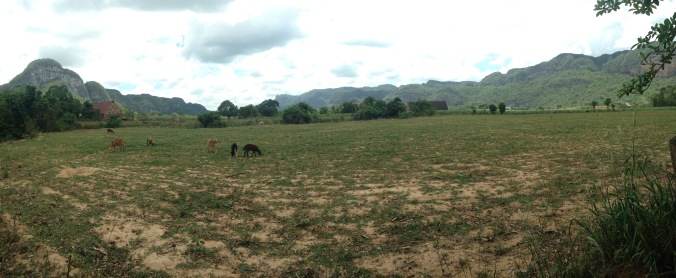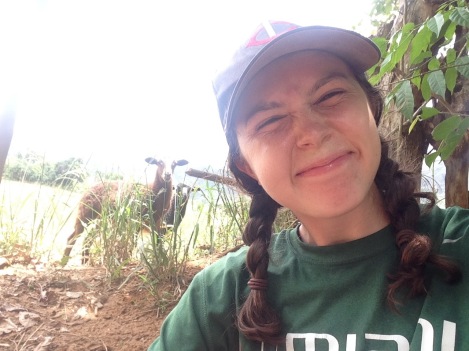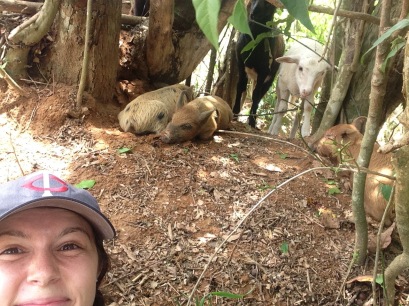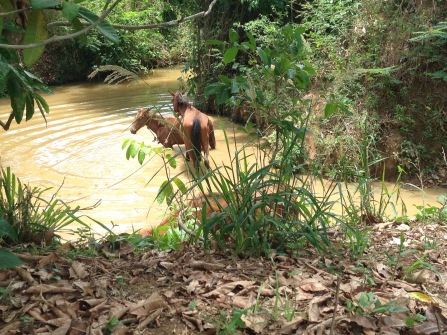I was going hiking in the mountains! Or at least that’s what I thought…Since arriving in Colombia last May, I have had Ciudad Perdida, also known as the Lost City, on my list of places to visit. Ciudad Perdida is an abandoned city in the Sierra Nevada Mountains on Colombia’s coast hidden away for over 350 years until its recent discovery in the past several decades. Known as the Machu Picchu of Colombia, it was recently opened to tourism by way of a four to six day trek through a mountainous jungle. As teaching fellows started planning their trips for a weeklong school holiday in October, I knew I was going to do the trek.
My original plan was to complete the trek in June, but of course, I was too sick then to walk down the street let alone up a mountain. This time, though, unlike last, I was healthy and ready – or so I thought. But something wasn’t right. I was clear about wanting to go to the coast during the school break and clear, within myself, that I wanted to travel on my own due to my general aversion to large groups and love of solo adventures. But one thing was tripping me up – I wasn’t the only one going to the coast. There was another group, or several groups, of fellows who also had similar plans during the break. Given this knowledge, I felt a pressure to join them and was afraid of saying, “Hey – so we’re going to the same place but I think I’m going to break off and travel on my own…” out of fear of what they would think and that they might eventually, upon return to our normal post-vacation lives, abandon me, leaving me friendless and alone. The Ciudad Perdida trek, however, was the perfect opportunity to do my own thing. Suddenly, it went from being something I solely wanted to do for myself to something I wanted to do to get away from others. I needed space but was too afraid to ask for it.
Then, rather than being upfront and honest about my thoughts, I disconnected from myself. The first sign of dysfunction was obvious, I didn’t sleep well the week leading up to the trip. Of course I ignored the insomnia and excused it as a case of nerves for the upcoming challenging and unfamiliar adventure. What I didn’t realize was that in my head, I was turning the trek into a thing, an escape, and getting very, very attached. So when it got cancelled for reasons way outside of my control (aka a hurricane) the day before I was supposed to leave, I was hit with serious disappointment but even more than that – panic. Because, like the city, I too was lost. And I’m embarrassed to admit it but I had been using the city and the trek as my excuse to get found. Somewhere deep inside me, I hoped if I did the physical hard work to hike to the city, the emotional work would follow. I was banking too much on external circumstances to do another reset after disconnecting from myself once again.
What was clear, most of all, when I processed my disappointment regarding the cancellation is that I had expectations. And got attached. And in my mind I turned this hike into a journey to freedom. Freedom from resentment I had for myself for not using my words, caring about what others thought and letting that influence the way I lived my life. I thought that walking away from the group to embark on the trek would be following my own path. What I didn’t realize is that I was childishly running away and hiding behind an excuse – the trek – to avoid using my words and owning my needs.
I don’t know why but I told myself that at the top of the mountain in the place where the city used to be, I would find myself and my voice. This challenging journey to the Lost City would bring struggle, clarity and eventual relief and rewards. And maybe it was true. But I didn’t need a hike to do that. Nothing external could get me to the places I needed to go myself. In addition, I couldn’t use it as an escape either: a trek away from the boundaries I needed to set and away from the fears I had of being abandoned. Rather than trekking to independence, like I thought I was doing, I was running away to hide in the mountains. Of course it got cancelled, the Universe was laughing at my insanity.
The hike was cancelled. And now I two plane tickets, an eight-day trip and absolutely zero plans. What to do next? My wonderful mother and father had wonderful advice. Do whatever you want. Maureen reminded me that how things proceeded going forward was up to me. I could make the vacation great or I could make it terrible. It was my choice.
So the next day, I set off with zero plans, zero itinerary but with the very, very clear feeling that I wanted to travel on my own. I told the group I was going to do my own thing and, for what may have been the first time in my life, decided to spend a week living day to day in the moment and without plans.
And do you know what that led to? A spontaneous bus ticket to a little pueblo by the ocean where I swam in the sea, saw snow and floated down a river in the middle of the jungle. A spur of the moment ticket purchase to the Colombia/Uruguay World Cup Qualifier soccer game because, fuck it, why not? It led to sleeping outside in a hammock in Tayrona National Park as I listened to the ocean crashing around me and, later, a long overdue dance party in Cartagena. I’m not going to lie…it also led to some serious crises of confidence, tears and a very hard lesson or two. But overall, it led to me falling asleep nearly every night with a sense of joy in the center of my heart because I knew that I was waking up each morning and following it. It led to me asking myself every day what I wanted and listening, for once, because it’s not like I had other plans.
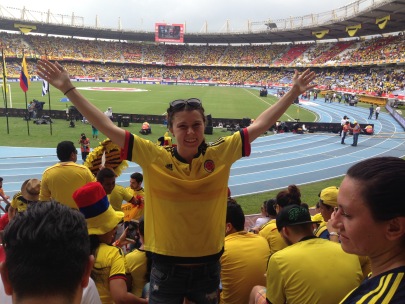
The HIGHLIGHT of my Colombian experience so far
It led to me being alone. And loving it. And once again wondering why, if being alone felt so good, did I keep settling for anything less fulfilling?
But more importantly – why did I keep abandoning myself, my wants and my needs to try to prevent others from abandoning me? What was I so afraid of? Few things could be worse than continuing my self-inflicted torture where I kick and scream internally while sacrificing myself and my needs to try to fit in with others and not miss out. What I need to do is accept our differences and letting them be them and me be me, instead of wishing one of us was different and staying hooked.
This fear and pattern, like many that I have, stems back to childhood where I acted out of fear to avoid my mother’s punishment and threat of abandonment. The wound started then and was later ingrained deeper as the Hunsickers entered the picture and my mom continuously chose their needs over my own. As I started to realize the inequity in the household, connect with myself and try to live in authenticity with the needs that followed, problems started to arise. The closer I got to myself, the further I got from my mom. Every time I stepped out of line, whether it be at the age of eight or the age of 18, I was upsetting the balance of our relationship. If I offset it too far I was afraid she would be gone. And eventually she was – but in retrospect, I’m not really sure she was ever even there. If she were, there would have been no consequence to me connecting with myself, having my voice and asking for my needs. If she had been there, there would have been no threat to losing her to anyone. If she had been there, I would not, too this day, live with the irrational fear of being abandoned because it never would have even been a threat. And if she had been there, I don’t think I ever would have been lost in the first place. There would have never been a need for me to disconnect from myself.
There are two problems with the fear of abandonment. One – anyone who does not support your in your needs, your voice and your quest to find your true self should not be in your life, and thus when and if they leave it should be a blessing – not abandonment. And two – the only thing worse than being ‘abandoned’ by others is abandoning yourself. And by living life leading up to this vacation trapped in that fear of being abandoned by others, I did exactly that: I abandoned myself.
After staying confined within this fear for the majority of my life, I clearly had some work to do to break that pattern. Unfortunately, no trek that I set off on to run away was going to help me reconnect. That would have been just too easy. Instead, I had to follow Maureen’s advice and do whatever I wanted.
Thrilled after a 5:00 a.m. wake up for the sunrise in Tayrona National Park
After leaving the group, I went off on my own adventure. And each day as I checked in with myself, I slowly started to reconnect. I found a little bit of myself as I made the decision to spend the night in Palomino rather than go to a group beach day in Santa Marta and a little bit more as I silently floated down a tube on a river in the middle of the jungle the next day. Another part of me was found as I took on the overwhelming city of Barranquilla, driven by my determination to make it to the soccer game. I reconnected every morning when I set an early alarm to walk the beach during the sunrise, and particularly, during one 6 a.m. beach walk where I, for the first time ever, stood on sand and stared at snow.
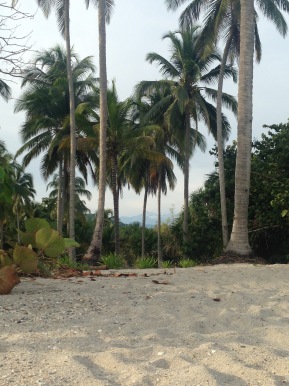
Best of both worlds – beach and snowy mountains (in the distance)!
Little parts of me started to reconnect through every decision I made during the trip. I took ownership of the week and now I need to do it for the rest of my South American experience. And my life. That is when I will truly find myself: when I can wake up everyday, check in with what I want to do and what makes me happy and do it rather than being so concerned about the others opinions and their potential to abandon.
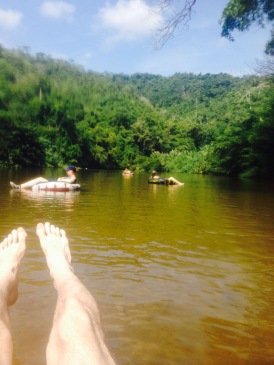
Tubing through the jungle in Palomino
I had no right to be looking for the Lost City. What I needed to spend my time on was the lost Lucy. The little girl that years ago locked herself up to please others and tried, at all costs, to avoid being found and rejected. I need to remind myself that the only way to cure my fear of abandonment, and end my pattern of trying to please others, fit in and resisting setting boundaries, is by not abandoning myself, which ironically means not trying to please others and actually setting boundaries. While in many ways I succeeded during this trip, there were also times that I failed pretty miserably. But that is life and life is learning.
I disconnect and reconnect from myself on almost a weekly basis. I have surges of power where I take charge and then flickers of doubt where I recline. But now I am aware of it. And the moments where I lose myself feel more uncomfortable than they used to because at least now there is some sort of connection. For so many years there wasn’t. Up until recently, life was lived in complete disconnection and constant fear.
On this vacation, I wanted to go looking for something that was lost and in turn, be found, but to do that, I envisioned trekking through the wrong jungle and facing the wrong obstacles. My trek is internal and can be embarked on now matter where I go.
When I ran into the ocean in Palomino, my first surge of freedom during this vacation, I started laughing as I was consumed by relief and realized how far I had come. I was swimming in the Caribbean Sea, despite my childhood fear of oceans. I was living abroad in a ‘third world country’ despite just about every path I was expected to follow as a child by my family. I was probably, at this point, speaking more Spanish than English and tapping into a long repressed gift and love of language. These were my choices and the path to follow them appeared because, at some point in time, thanks to the wonderful support of Maureen, my dad, Marae and Charlie, people who would never abandon me, I started to connect. Despite the times that I faltered, I was making my own decisions, living my own life and reconnecting. Despite everything, I was making progress.





